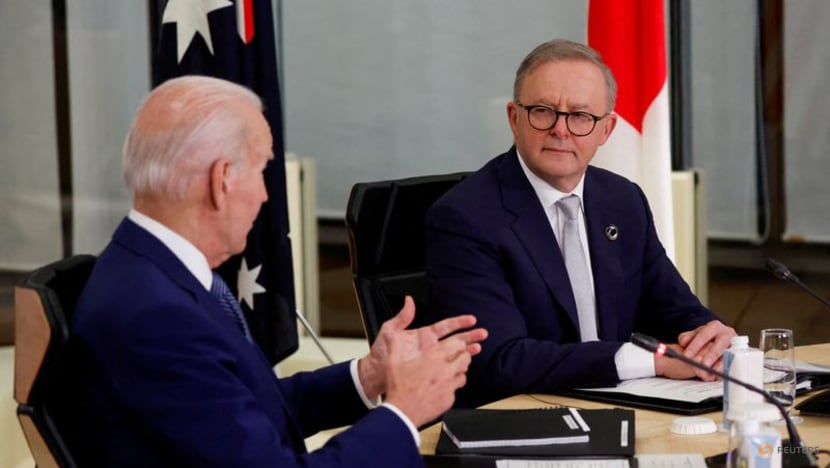“The US-Australia relationship is stronger than it has ever been,” said University of Sydney’s History Professor James Curran.
“Australia is now, in my view, locked in to the US’ grand strategy in Asia. Australia is giving the US so much – in terms of (military) bases in Australia, its ability to store defence material and logistics ... so this visit comes at a very important time.”
Mr Albanese will meet US President Joe Biden for official talks in the Oval Office on Wednesday (Oct 25). He will also lobby lawmakers to pass legislation necessary for the AUKUS defence technology partnership.
STRATEGY TO COUNTER CHINA
Earlier this year, Canberra signed a deal to buy nuclear-powered submarines from the US, as part of the so-called AUKUS agreement, the trilateral security partnership the two countries share with the United Kingdom.
The pact aims to bolster security cooperation in the Indo-Pacific to counterbalance the perceived threat from Beijing’s growing assertiveness and influence, as the latter woos island nations in the region.
Some political commentators have argued that Canberra has let its guard down in recent years, and should have been paying more attention when it came to addressing China’s intentions in the Pacific.
“We have seen the Chinese sewing up deals with island nations right on our border, the latest being East Timor a matter of weeks ago,” said Mr Piers Akerman, a conservative columnist for The Sydney Sunday Telegraph newspaper.
“We really cannot afford to have Chinese defensive positions brought right up to our continental shelf and so we really need stronger – not weaker – ties with the US. We need shoring up and we need reassurance that the Americans will be here to protect us.”
FEARS OF US DISTRACTION
Meanwhile, some observers said there are worries that escalating conflict between Israel and Hamas in the Middle East could shift US focus away from the Pacific.
“This has been a long-standing fear for US allies in Asia – that America keeps on getting pulled back into Europe or back into the Middle East,” said Prof Curran.
“We thought that with (former US President Barack) Obama’s pivot to Asia, and Biden continuing that re-balance of American attention to this part of the world, that they were fully focused and energised in dealing with China.
“While it is not like the US has taken its eye off the China ball, nevertheless the more that they keep on getting sucked into the vacuum of the Middle East and Europe, the less attention they can give to this region.”
Mr Albanese has said he will discuss the Israel-Hamas war with US President Joe Biden during his visit.
Mr Michael Green, CEO of think tank the US Studies Centre, said: “Australia has a long history of pretty heavy involvement in the Middle East with a lot of expertise and knowledge.
“I’m confident when this comes up, President (Biden) and the Prime Minister (Albanese) will be aligned and have a strong statement of unity and solidarity to demonstrate.”
Other issues, including economic, climate and energy initiatives are also likely to be on the agenda during the trip.
While events domestically and internationally might divert attention from Mr Albanese’s visit to Washington, it is also clear that both countries need each other in these uncertain times, observers said.
“Only a handful of world leaders are invited to the White House for a state visit each year," said Mr Green.
“So (Albanese's trip) tells you that the Biden administration puts a very high priority on the Indo-Pacific, and in particular on Australia as a partner to deal with the growing uncertainty in this critical part of the world,” said Mr Green.

